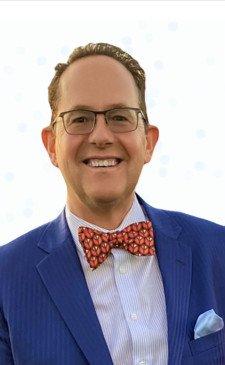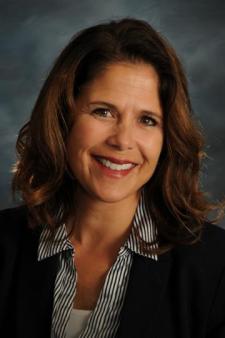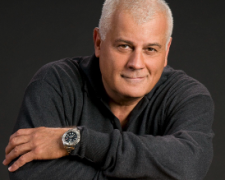The Lead: March spotlight series
Alumni Spotlight: Dr. John Severson
Dr. John Severson (Ph.D. ’13, Educational Leadership, M.A. ’94 Educational Leadership) was appointed earlier this year as Executive Director of the Michigan Association of Intermediate School Administrators (MAISA). Previously serving as the Superintendent of the Muskegon Area ISD, Severson was encouraged to apply for the position by peers because of his great passion for helping kids and his dedication to involving others in the process.
“I feel so fortunate to have many supporters and leaders who have helped me along the way. I recognize that to have such success, one must be open to learning from their peers and learn and focus always to be better. Being student-centered is the foundation of having such positive results,” shared Severson.
As Executive Director, Severson will focus on ensuring all students across the state of Michigan are well, graduate on time, and have great futures. He plans to accomplish these goals by working with teams to develop systems that ensure every child’s success. “I believe the problems we face today can only be solved when we collaborate and build strong relationships to solve problems through the lens of those we serve,” he explained.
Severson began his career as an instructor with Allegan Community Education in 1988 and transitioned to working with the Marcellus Community Schools in 1990. During his five years with the district he served as a teacher, coordinator, assistant principal and principal with a focus on strengthening community and alternative education and related services within the district. He then spent four years as principal of the Vine Street Alternative High School, a Kalamazoo Public School, and two as principal of Harper Creek High School, a Harper Creek Community School, before returning to community education as the Community Education Administrator for the Portage Public Schools. In this role he oversaw Adult Education, English as a Second Language Courses, the G.E.D. Testing Center, Curious Kids Childcare, and community enrichment courses. During this time, he facilitated a rewriting of the alternative education curriculum to include new problem-based learning initiatives, new reading and writing strategies, and to integrate new dual enrollment and vocational partnerships for all alternative education students.
In 2004, Severson began his career as a superintendent, serving as the superintendent of Harper Creek Community Schools for ten years and then superintendent of the Muskegon Area ISD for another eight. “As a superintendent, you make daily decisions that impact thousands of children. I give the same care and consideration to each decision I make as I would if it were to impact my own child,” he explained.
As superintendent of Harper Creek Community Schools, Severson increased the graduation by over seven percentage points, redesigned the high school schedule to include support courses and approximately forty new electives, utilized a professional learning culture to develop numerous K-12 curriculum initiatives and programs like writing across the curriculum and character education programming, established quality marketing processes to communicate the district vision, student achievement building projects, community partnerships and overall district successes, and completed over $70 million in building projects all while personally mentoring twenty-five high-risk students each school year.
As superintendent of the Muskegon Area ISD, Severson worked to partner with others to extend and improve the impact of the schools. In the area of early education, he helped ensure strong Great Start Readiness and Head Start programming for over 70 preschool classrooms, enhanced and improved the Muskegon County collaborative goal of having all children ready for kindergarten by promoting and supporting early literacy initiatives through 80 partners. He also expanded the delivery of books to infants and toddlers from approximately 40,000 to over 130,000 books per year and was appointed by Governor Gretchen Whitmer as a member of the Early Childhood Investment Corporation Executive Committee.
At the K-12 level, he led the MAISA instructional committee in its work of equitably implementing the General Education Leadership Network initiatives across Michigan; redesigned a community approach called Thrive which enlists the support of numerous partners focused on goals and strategies that improve student achievement; incorporated the district into the MIExcel Blueprint for Rapid Turnaround Model, which includes new processes that systematically focus and leverage best practices to accelerate student achievement; extended and established new partnerships in literacy across the Muskegon region and county, including work with the Reading Now Network and the High Impact Leadership Grant which is administered by WMU; and added eleven new literacy and mathematical instructional coaches county-wide. He also installed the foundations of Interconnected Systems Framework and expanded from three to 23 mental health clinicians in just two years, secured a $4.5 million grant to provide training and support to school districts, participated with the Michigan Civil Right Council in designing a new tool, Resource Guide to Develop a School Equity Plan, and expanded collaboration with the Department of Health and Human Services, local law enforcement, students and parents.
To ensure student success beyond the K-12 school system, Severson collaborated with key community leaders in the implementation of the Muskegon Area Promise, a program which provides two years of free tuition to qualifying high school graduates in Muskegon County who attend Baker College or Muskegon Community College. He also collaborated with diverse leaders and partners representing higher education, local school districts, government, non-profits, and business including members of the regional talent consortium Talent 2025 to improve learning outcomes for children and increase career attainment for graduates. Some of the new career programs and supports for students of all ages that he helped establish are: Linked Muskegon, Muskegon Made, Early College, the addition of new county-wide Career Specialists, career fairs, new internships and externships, and a new pilot STEM program that serves 75% of the district’s schools at their Career Technical Center.
During his current role as Executive Director of MAISA, Severson plans to stay connected to schools through the many networks, programs and systems that connects MAISA to schools across Michigan. “We work to bring ISDs together to serve as a quality resource for leadership, innovation, partnerships, advocacy and support. Personally, the relationships I have built in 34 years in education are used to ensure our work will help those we serve to succeed,” he explained.
For anyone considering an advanced degree in Educational Leadership, Severson encourages you to go ahead and take that first step to become a leader amongst leaders. “I believe the most challenging thing in life is to get started! I would recommend taking the time to meet with a representative from the program and ask them your questions about the program and its philosophy. I finished my doctorate when I was a K-12 superintendent. Even though my job was incredibly busy, the professors I had were truly amazing. I appreciated the ability to research and the opportunity to apply what was being learned in real-time. All of it made me a better leader,” he said.
Severson especially appreciates his dissertation chair, Dr. Sue Poppink, and his committee members, Dr. Dennis McCrumb and Dr. Terance Lunger from his time at WMU and found all the faculty members to be incredibly supportive. “Every class and interaction helped me with my doctoral degree and career,” he shared. “I truly stand on the shoulders of giants and recognize that my education at WMU was the foundation of work that I have accomplished in helping so many children succeed. WMU changed my life…it can change yours too!”
Student Spotlight: Amie McCaw
My first degree was a B.S. from Purdue University in the Restaurant Hospitality Management Program. After working in the Hospitality field for a few years I decided to go back to school to follow my passion for teaching. I was a mother of three young children and worked part-time while I attended Goshen College where I attained my teaching certificate.
I received my Masters from Western Michigan University in K-12 Educational Leadership in 2007. I am currently a student in the WMU Ph.D. K-12 Educational Leadership program and plan to be done with my degree in 2025.
I was hired by Vicksburg Community Schools in 1999 where I taught at Indian Lake for seven years. During my seven years I taught 1st, 4th, and 5th grade. I was also a Literacy Coach and Interventionist.
My first principal position was for Gull Lake Schools and I was the principal at Kellogg Elementary and Thomas Ryan Intermediate. After five years I took a principal position with Schoolcraft Community Schools, which brought me closer to home. I was the principal of both the Early Elementary and Upper Elementary during my three years with Schoolcraft Community Schools.
In 2015, I accepted a position back with Vicksburg Community Schools as the Sunset Lake Elementary Principal. I am in my eighth year as the Sunset Lake Principal.
Early in my principal career, I joined MEMSPA, Michigan Elementary Middle School Principal Association, under advisement from my past principal. It was some of the best advice I have ever had in my career. MEMSPA gives principals a network of educators across the state who have a passion to help schools learn and grow. MEMSPA gives principals and schools a voice and helps principals learn the importance of advocating at the capital to help ensure legislation includes the voice of ALL children and focus for the whole child. I have been on the Executive Board for the past ten years and this year I am proud to serve as the MEMSPA President.
I chose Western Michigan University’s Ph.D. program largely due to a mentor of mine. Dr. Patricia Reeves, hired me for my first teaching position when she served as the Vicksburg Community Schools Superintendent. Dr. Reeves has taught me the importance of always striving to learn and grow as an educator. The field of education is not stagnant and as an educational leader it is an obligation to continue to learn and grow. I have a passion for teaching and helping others learn and grow like my mentor Dr. Reeves.
My experience in the doctoral program has been very enlightening. I have enjoyed being able to work alongside other students from diverse backgrounds and diverse experiences. I have appreciated the grace given from my professors when I struggle at times balancing coursework and the demands of being a full time principal.
I have been in the K-12 education world for over twenty years and many things have changed during the past two decades. However something I believe remains the same and will continue to be an important part of our field is making sure we give our students a voice. I am a huge advocate of the Leader in Me which focuses on teaching students Stephen Covey’s 7 Habits of Successful People and helping students find their unique greatness.
Faculty Spotlight: Dr. David Szabla
As the Interim Chair of the Department of Educational Leadership, Research and Technology, Dr. David Szabla brings years of experience leading change in not-for-profit, for-profit, education, government, and military organizations to the department. In addition to his responsibilities as department chair, David leads and teaches in WMU’s MA and PhD programs in Organizational Change Leadership. An Organizational Change scholar, David is editor-in-chief of The Palgrave Handbook of Organizational Change Thinkers, The Edward Elgar Handbook of Research Methods in Organizational Change, and Research in Management Consulting. His research centers on organizational change, organizational leadership, and the digital organization. Dr. Szabla has been published in several journals including Human Resource Development Quarterly, Research on Organizational Change and Development, and Emergence: Complexity and Organization. David received his doctorate in Human and Organizational Studies from The George Washington University.
READ February'S SPOTLIGHT SERIES




